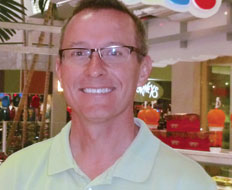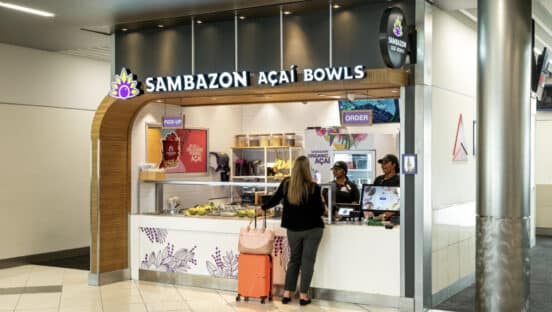Sean Falk joined the United States Marine Corps in 1989. After time as an infantry officer, on recruiting duty, and in the Reserves—time that took him to Desert Storm and Bosnia, among other operations—Falk moved to serving in a different fashion when he opened his first Mrs. Fields Cookies unit in Monroe, Michigan, in 1998. Since then, he’s become an operator with 12 brands, including Great American Cookies, Pretzelmaker, and Salsarita’s Fresh Cantina, in the states of Ohio, Michigan, Kentucky, and Tennessee.
Falk discusses his transition from military service into the world of quick service and how lessons from his past can become keys to franchisees’ success.
1. Focus on the business
At the time I went into franchising, I didn’t understand how my military background would translate into my quick-serve career. When I opened up my first location, I worked from open to close, 8 a.m. to 10 p.m., seven days a week, for six months straight. I was used to the philosophy that if there is a job out there, I have to get it done and I have to do it correctly.
Obviously I’m aware of my past experience translating into my success, and that’s what I try to advocate to veterans, but I wasn’t relying on that experience. I was basing my business endeavors more on wanting to be my own business owner. The opportunity came to me at a relatively low risk and I took the chance. The idea of franchising, however, is strikingly similar to military service.
2. Execute the plan
If I were standing in front of a bunch of business leaders and presented to them an idea about an organization that has all its operations and procedures down pat, a manual to teach you everything, and a high success rate if executed accordingly, they might think I’m explaining a franchise opportunity. I’m actually describing the United States military. The military is an organization that’s been around for hundreds of years and has figured out what to do and how to do it. It doesn’t need applicants to come in with prior experience. What it does is gets young men and women who are motivated, puts them through training, and teaches them to execute the system in place to be successful.
That’s what franchising is, too. There is a system in place, and if you execute it accordingly, you’ll have your sought-out success. Prospective business owners don’t need to have years of prior experience in marketing or real estate. All that needs to be understood is provided, and all that really needs to be done is to follow the plan of action.
3. Learn how to be independent
The one thing I had to understand starting out was how to lead in a different way. In the military, our motivation is homogenous; the same goal is uniform throughout. When I started in quick service, I was dealing with families, children, and men and women with different socio-economic backgrounds. I had to figure out what motivated them and how to kick-start their excitement.
My experience with franchising has always been an independent operation. Military success is built around small-unit leadership. You’re operating small unit–driven stores and you’re operating it solo. The franchisor, or military commander, is not always there to hold your hand, but is there to teach you in the first place and then let you go out and be successful. As I continued to grow in scale, I knew I had to scale up my command and my leadership.
Just like the military, everything in quick service should be scalable. Layers of management or operations should be put in place at the start, and as more and more business develops, those small units need to have layers added to them. Those new layers, such as supply or administrative support, are put in between me and the managers who are trying to run the units.
4. Don’t reinvent the wheel
I’ve had former veterans come to me and not understand the idea that their military experience can translate. They might try to tell me that all their skills revolve around militaristic operations or specialized skills. I explain to them that what we wanted from the military was motivation and direction. We wanted our work ethic and drive to morph into something successful, and franchising can do that, too.
My operations are based upon the plan sent out by the franchisor. I don’t have to be responsible for the site selection or business model. The franchisor has made those decisions, and the franchisor is far more capable to make those decisions. I’m not going to try to reinvent the marketing strategy or promotion it is implementing. The experts at another level are doing that for me, and all I need to do is follow that order and execute it correctly.
The military is similar. I needed to do what I was directed to do. One person can’t drive the tank, load the artillery, and charge the hill at the same time. You rely on the support structure that is set out for you. You rely on others to do what they do best. I’m not going to spend my time trying to figure out something better than what was given to me from someone else who knows more. Once that command is followed through correctly, it will transform into success.







